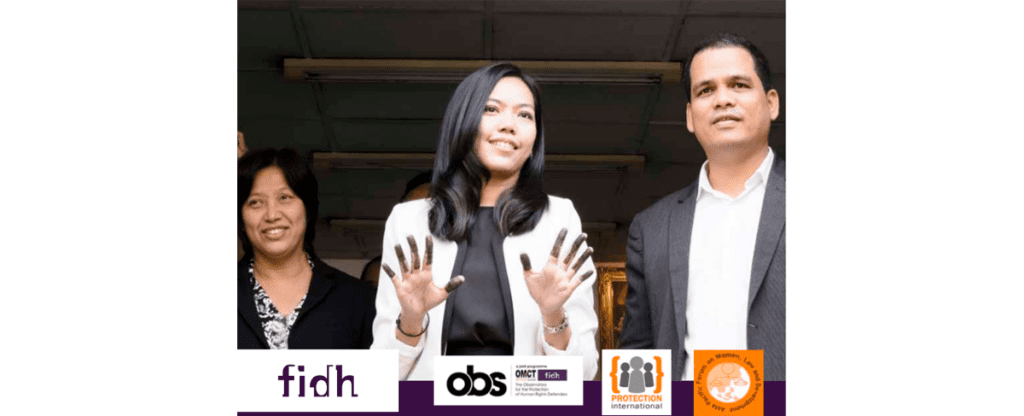PRESS RELEASE
Thailand: Women human rights defenders at heightened risk of attacks and intimidation
Publication of a joint report
Bangkok-Geneva-Paris, July 3, 2017 – Women human rights defenders (WHRDs) in Thailand are at heightened risk of attacks and intimidation since the May 22, 2014 coup d’état, the Observatory for the Protection of Human Rights Defenders (an FIDH-OMCT partnership), said today.
In harm’s way: Women human rights defenders in Thailand, a new report jointly released today by the Observatory, Protection International (PI), and the Asia Pacific Forum on Women, Law and Development (APWLD), documents the pattern of repression of WHRDs in Thailand, especially rural women.
The report is released ahead of Thailand’s review by the UN Committee on the Elimination of Discrimination against Women on July 5, 2017. The Committee oversees State parties’ compliance with their legal obligations under the Convention on the Elimination of Discrimination against Women (CEDAW).
“The all-male Thai military junta has created an increasingly hostile environment for women human rights defenders. To fulfil Thailand’s obligations under the CEDAW, the junta must take immediate steps towards combating discrimination and protecting women who work to defend human rights,” said FIDH Vice-President Guissou Jahangiri.
The report highlights serious concerns over the ruling National Council for Peace and Order (NCPO)’s failure to ensure protection for WHRDs. Under the NCPO, WHRDs have faced an array of abusive practices, including violent acts and threats of violence, intimidation, judicial and online harassment, and denial of justice. This has resulted in their deprivation of the exercise and enjoyment of women’s human rights and fundamental freedoms guaranteed by the CEDAW.
“Despite their courage, women human rights defenders are exposed to unique challenges, which are reinforced by a wider context of gender inequality. In Thailand, the situation is exacerbated by the NCPO’s policies and actions that prevent women human rights defenders from carrying out their activism,” said OMCT Secretary General Gerald Staberock.
Thailand was previously reviewed by the CEDAW Committee in 2006. Several UN human rights bodies, including the UN Human Rights Committee (CCPR), the UN Committee on Economic, Social and Cultural Rights (CESCR), and the UN Committee against Torture (CAT) have continued to make recommendations to the Government regarding the protection of human rights defenders. However, the critical situation of WHRDs in Thailand has yet to be specifically addressed at the international level.
The full Observatory joint report is available online in English here.
Ahead of the CEDAW review of Thailand, FIDH and its Thai member organization Union for Civil Liberty (UCL) also submitted a joint shadow report that documents how women prisoners in Thailand are disproportionately affected by poor detention conditions. Such conditions include overcrowding, detention in prisons located far from their families, punishment practices, lack of adequate sanitation facilities, and deprivation of adequate healthcare and nutrition.
Women have a host of gender-specific needs that are often neglected in a penitentiary system that is controlled by men and caters to the majority male population. Discrimination in accessing gender-specific services and maintaining family links constitute discrimination within the meaning of Article 1 of the CEDAW.
In addition, with 113 women prisoners per 100,000 of the national female population, Thailand has one of the highest incarceration rates of women in the world. Women are disproportionately affected by the imposition of harsh penalties, including the death penalty, for drug-related crimes. In June 2017, 81% of the women prisoners in Thailand were incarcerated for drug-related offenses, a percentage that is higher than the 70% of the male prison population incarcerated for drug-related offenses.
The Observatory for the Protection of Human Rights Defenders (the Observatory) was created in 1997 by FIDH and OMCT. The objective of this program is to prevent or remedy situations of repression against human rights defenders. FIDH and OMCT are both members of ProtectDefenders.eu, the European Union Human Rights Defenders Mechanism implemented by international civil society.
For more information, please contact:
• FIDH: Samuel Hanryon (French, English): +33 6 72 28 42 94 (Paris) / Andrea Giorgetta (English): Tel: +66886117722 (Bangkok)
• OMCT: Delphine Reculeau (French, English): +41 22 809 49 39 (Geneva)
This report is a revised and updated version of the joint shadow report submitted by the Observatory for the Protection of Human Rights Defenders (an FIDH-OMCT partnership), Protection International (PI), and the Asia Pacific Forum on Women, Law and Development (APWLD) for the 67th session of the UN Committee on the Elimination of All Forms of Discrimination against Women (CEDAW) in Geneva on 5 July 2017.
The Thai government’s combined sixth and seventh periodic reports under Article 18 of the Convention on the Elimination of All Forms of Discrimination against Women (CEDAW) fail to mention the situation of women human rights defenders (WHRDs) in Thailand.
WHRDs in Thailand make a vital contribution to the advancement of human rights and are in urgent need of recognition and protection. Since the May 2014 coup, they have increasingly become at risk of violence, discrimination, and other violations of their human rights.
WHRDs and rural women continue to be among the most marginalized members of society in terms of their exclusion from participation in political and economic processes. WHRDs often focus on issues that put them at particular risk of violence and other forms of abuse, such as judicial harassment and by doing so face numerous abuses and persistent barriers to the full enjoyment of their human rights because they are women.
Despite the obstacles they face, many rural WHRDs are at the forefront of human rights advocacy in many fields, including land use, the environment, and natural resources.
The following report gives an insight into the situation of WHRDs in Thailand and the risks they face in the course of their struggle to defend human rights. It brings forward recommendations urging Thai authorities to take measure to protect and create a stable working environment for all WHRDs.
Read the full report here.


